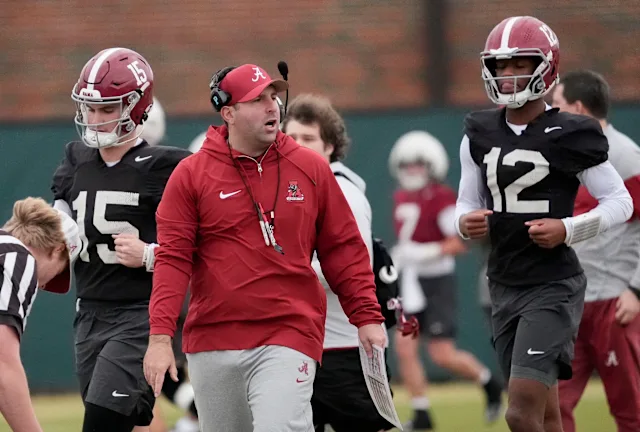Kalen DeBoer isn’t just inheriting a job. He’s inheriting a legacy. And with that comes sky-high expectations, especially at a place like Alabama, where winning isn’t a goal—it’s a mandate. As the Crimson Tide transition into a new era post-Nick Saban, the quarterback room stands at the center of attention. All eyes are on Jalen Milroe and the supporting cast of passers as they prepare for a pivotal summer under their new head coach. And DeBoer, the man chosen to carry the torch, made his message to the quarterbacks crystal clear: leadership, accountability, and growth are non-negotiable.
DeBoer is no stranger to elite quarterback play. His track record includes helping Michael Penix Jr. blossom into one of the nation’s most prolific passers at Washington. But replicating that kind of success in the SEC requires more than a brilliant offensive mind—it demands an understanding of culture, pressure, and the relentless pursuit of excellence. From day one, DeBoer has made it clear that being the quarterback at Alabama is about more than arm strength and touchdowns. It’s about setting the tone for the entire team, both on and off the field.
As the summer approaches, DeBoer has emphasized that the quarterback competition is still open, even if Milroe enters as the perceived favorite. The returning starter showed flashes of brilliance last season, including a jaw-dropping performance against LSU and clutch moments in the Iron Bowl. But DeBoer isn’t handing out roles based on past highlights. He’s building his team from the ground up, and that includes re-establishing standards within the quarterback room.
“Being the quarterback at Alabama means you have to be the standard,” DeBoer said during a recent media session. “Everything you do—how you carry yourself, how you lead, how you prepare—has to reflect that standard.”
That message has been echoed in meetings, practices, and private conversations. DeBoer is challenging his quarterbacks to not just think like players, but to act like CEOs of the offense. With the departure of several key offensive leaders, including JC Latham and Jermaine Burton, the Tide will rely heavily on their quarterback to stabilize the huddle, command the locker room, and raise the bar for everyone around them.
For Milroe, this summer could be career-defining. After an up-and-down 2023 season that saw him benched and then reinstated, he now faces the challenge of mastering a brand-new system. DeBoer’s offensive philosophy is built around timing, rhythm, and decision-making. It demands precision and poise, two areas where Milroe has shown improvement but still has room to grow. The athleticism is undeniable—he may be the most dynamic dual-threat quarterback in the country. But DeBoer is looking beyond the highlight reel.
“Jalen has the tools,” DeBoer said. “Now it’s about sharpening those tools every single day. This summer is when habits are formed. The great ones separate themselves when no one’s watching.”
That emphasis on discipline and preparation is a cornerstone of DeBoer’s message. The transition from spring to summer is crucial, and it’s often the period where leadership solidifies and chemistry takes shape. Without the structure of spring practice or the urgency of fall camp, summer workouts test a player’s internal drive. DeBoer wants his quarterbacks to take ownership of that process—not because they’re being told to, but because they understand what’s at stake.
Behind Milroe, the competition remains fierce. Ty Simpson, a former five-star recruit, and Dylan Lonergan, a promising young talent, have each shown flashes during spring ball. And while neither has unseated Milroe, DeBoer has made it clear that complacency will not be tolerated.
“We’re evaluating everything,” DeBoer explained. “The way guys study film, the way they communicate with their teammates, how they handle adversity in practice—it all matters. That evaluation doesn’t stop just because spring is over.”
For players like Simpson and Lonergan, the message is both encouraging and challenging. There’s a legitimate opportunity to earn playing time, but the standard remains sky-high. In DeBoer’s system, quarterbacks aren’t asked to just memorize plays—they’re expected to understand the “why” behind every decision. That intellectual investment is what separates good quarterbacks from elite ones.
To facilitate that growth, DeBoer and offensive coordinator Nick Sheridan are taking an individualized approach. Each quarterback is receiving tailored feedback, specific goals, and detailed film breakdowns. The objective is to maximize strengths while aggressively addressing weaknesses. In that environment, summer becomes more than just conditioning and 7-on-7 drills—it becomes a proving ground for leadership and maturity.
The quarterbacks have also been tasked with building trust among their teammates. With new transfers and early enrollees entering the fold, cohesion is critical. DeBoer has encouraged his quarterbacks to organize throwing sessions, host film study nights, and foster a sense of accountability that transcends the practice field. It’s a method he used successfully at Washington, where Penix became the emotional and strategic anchor of a College Football Playoff team.
“Culture starts with the quarterback,” DeBoer said. “If the quarterback is cutting corners, the team follows. But if the quarterback is obsessed with getting better—if he’s the hardest worker in the room—everyone rises with him.”
That leadership challenge comes at a unique moment in Alabama football history. For nearly two decades, the program operated under Nick Saban’s singular vision. His presence loomed over every practice, every meeting, and every decision. Now, with DeBoer at the helm, a new identity is forming—and the quarterbacks will be central to that transformation.
DeBoer has embraced the responsibility of following a legend without trying to become a carbon copy. His leadership style is more collaborative, more offensive-minded, and perhaps more player-driven. But he understands that success at Alabama still comes down to the same core principles: discipline, toughness, and execution. That’s why he’s placing so much emphasis on the quarterback position. It’s not just about who can throw the best deep ball—it’s about who can carry the burden of expectation and elevate the people around them.
The quarterback room isn’t just being asked to adapt to a new playbook. They’re being asked to help write the next chapter of Alabama football. That’s no small task. Every throw will be scrutinized. Every misstep will be magnified. And every success will be compared to the past. But DeBoer isn’t shying away from those expectations—he’s leaning into them.
He’s also instilling a sense of urgency. The SEC schedule waits for no one, and Alabama’s margin for error is razor-thin. Summer may feel like the offseason, but in DeBoer’s world, it’s prime time for separation. He wants his quarterbacks to treat every rep like it’s fourth-and-goal. He wants them to obsess over the small details—footwork, eye discipline, progressions—because he knows those details win games in November.
And perhaps most importantly, DeBoer wants his quarterbacks to love the process. Not just tolerate it, but embrace it. That’s how cultures are built. That’s how leaders are born. And that’s how dynasties are sustained.
In many ways, this summer will define the trajectory of Alabama’s 2025 season. The quarterback who emerges—whether it’s Milroe, Simpson, or someone else—will be the face of a new era. DeBoer knows the weight of that responsibility. That’s why he’s been so intentional with his messaging. He’s not just coaching quarterbacks. He’s molding standard-bearers.
“You’ve got to earn the right to lead,” DeBoer said. “And you earn that right every day—in the weight room, in the film room, and in how you handle your business.”
So as the heat of the Alabama summer settles in, so too does the pressure. But pressure is nothing new in Tuscaloosa. What’s new is the voice delivering the message. And Kalen DeBoer, with calm conviction and championship vision, has made his message loud and clear: the quarterback position isn’t just about making plays—it’s about making a program. And the time to take command of that responsibility is now.



